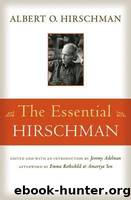The Essential Hirschman by unknow

Author:unknow
Language: eng
Format: epub
Tags: Essays, Social Science, Politics, development, Social History, History, Business & Economics, General, Economic Development
ISBN: 9781400848409
Google: NV4TAAAAQBAJ
Amazon: 1400848407
Goodreads: 17942061
Publisher: Princeton University Press
Published: 2013-01-01T08:00:00+00:00
THE concEPT of inTErEsT
from Euphemism to Tautology
Few words in public debate have been burdened with more baggage than âself- interest.â By the early 1980s, right- wingers were slinging it around to make the case for unfettering individuals from intrusive states; critics called them naive. They extolled the importance not of self- interest but of social purpose. Hirschman, as ever, found the exchange between ideologues unhelpful to say the least. His friend Pierre Bourdieu invited him to return to Paris, this time to deliver a series of keynote lectures at the Collège de France; Hirschman chose the theme of an enlarged political economy ( une économie politique élargie), hoping to turn a dialogue of the deaf into fruitful conversation between adversaries. His goal was to show that the ideaâ the conceptâ of âinterestâ had a history and had been the battleground for economists since the seventeenth century. It was linked, however, not just to the concept of the self, but so importantly to the idea of political power itself. His point to the audience gathered in Paris was to show that personal welfare and statecraft were raveled together from the start. The effort to narrow the definition threatened to separate behaviors and activities from one domain of life from others, selfish or âinterestedâ motivations from altruistic or âethicalâ actions. This trend drained the concept itself of its great analytical power.
âJeremy Adelman
âinTErEsTâ or âinTErEsTsâ is one of the most central and controversial concepts in economics and, more generally, in social science and history. It is also extremely versatile, not to say ambiguous, and
markets
its meaning has been shifting a great deal. Since coming into widespread use, in various European countries around the latter part of the sixteenth century as essentially the same Latin- derived word ( intérêt, intéresse, etc.), the concept has stood for the fundamental forces, based on the drive for self- preservation and self- aggrandizement, that motivate or should motivate the actions of the prince or the state, of the individual, and, later, of groups of people occupying a similar social or economic position (classes, interest groups). When related to the individual, the concept has at times had a very inclusive meaning, encompassing interest in honor, glory, self-respect, and even afterlife, while, at other times, it became wholly confined to the drive for economic advantage. Correspondingly, âpursuing oneâs interestsâ can coverâ to the point of tautologyâ all of human action while it will more usefully designate a specific manner or style of conduct, known variously as ârationalâ or as âinstrumentalâ action.
The esteem in which interest- motivated behavior is held has also varied drastically. The term was originally pressed into service as a euphemism serving, already in the late Middle Ages, to make respectable an activity, the taking of interest on loans, that had long been considered contrary to divine law and known as the sin of usury. In its wide meanings, the term achieved at times enormous prestige as key to a workable, peaceful, and progressive social order. But it has
Download
This site does not store any files on its server. We only index and link to content provided by other sites. Please contact the content providers to delete copyright contents if any and email us, we'll remove relevant links or contents immediately.
International Integration of the Brazilian Economy by Elias C. Grivoyannis(111057)
The Radium Girls by Kate Moore(12026)
Turbulence by E. J. Noyes(8047)
Nudge - Improving Decisions about Health, Wealth, and Happiness by Thaler Sunstein(7706)
The Black Swan by Nassim Nicholas Taleb(7128)
Rich Dad Poor Dad by Robert T. Kiyosaki(6631)
Pioneering Portfolio Management by David F. Swensen(6300)
Man-made Catastrophes and Risk Information Concealment by Dmitry Chernov & Didier Sornette(6019)
Zero to One by Peter Thiel(5798)
Secrecy World by Jake Bernstein(4751)
Millionaire: The Philanderer, Gambler, and Duelist Who Invented Modern Finance by Janet Gleeson(4478)
The Age of Surveillance Capitalism by Shoshana Zuboff(4291)
Skin in the Game by Nassim Nicholas Taleb(4248)
The Money Culture by Michael Lewis(4205)
Bullshit Jobs by David Graeber(4190)
Skin in the Game: Hidden Asymmetries in Daily Life by Nassim Nicholas Taleb(4004)
The Dhandho Investor by Mohnish Pabrai(3764)
The Wisdom of Finance by Mihir Desai(3746)
Blockchain Basics by Daniel Drescher(3580)
